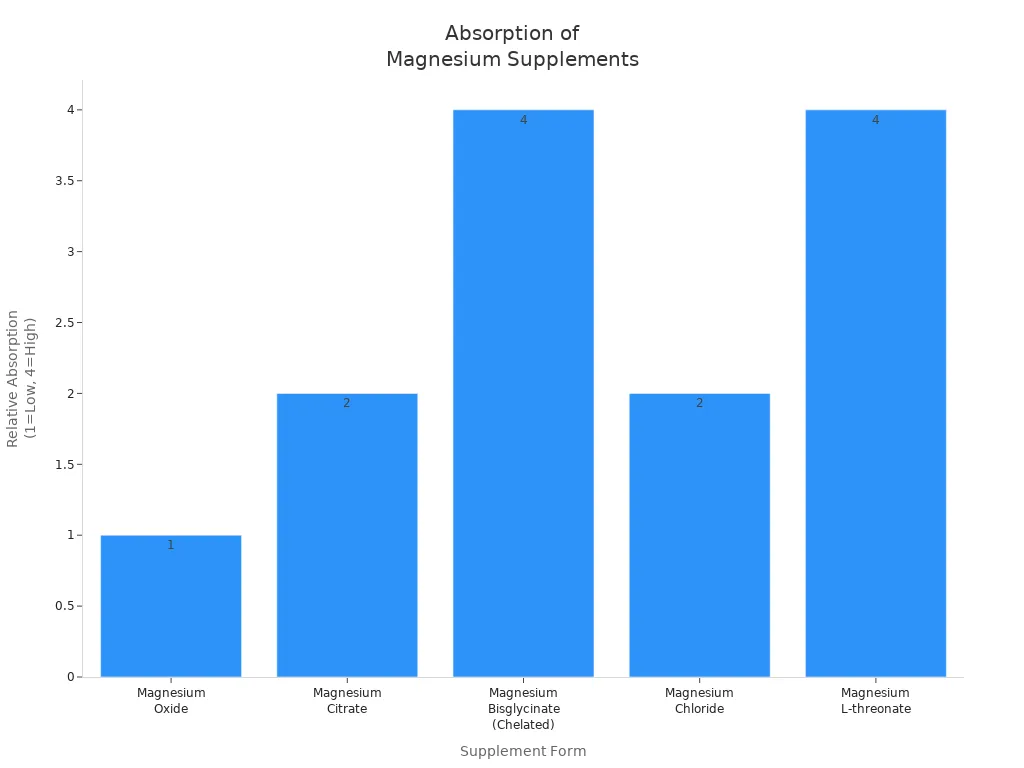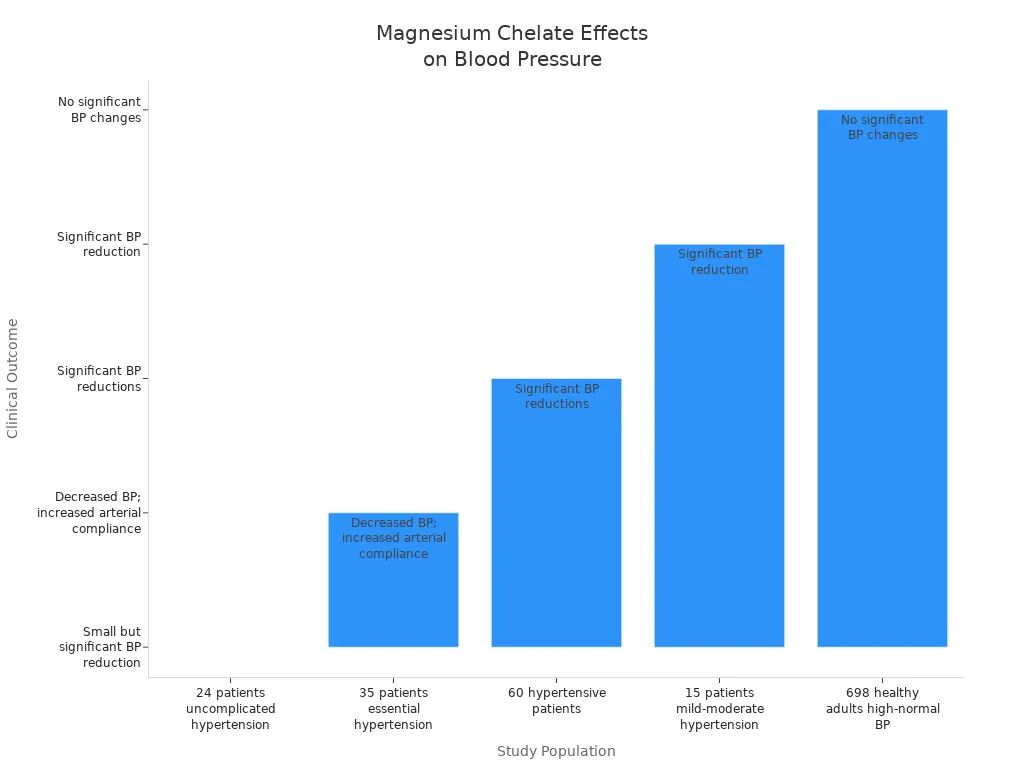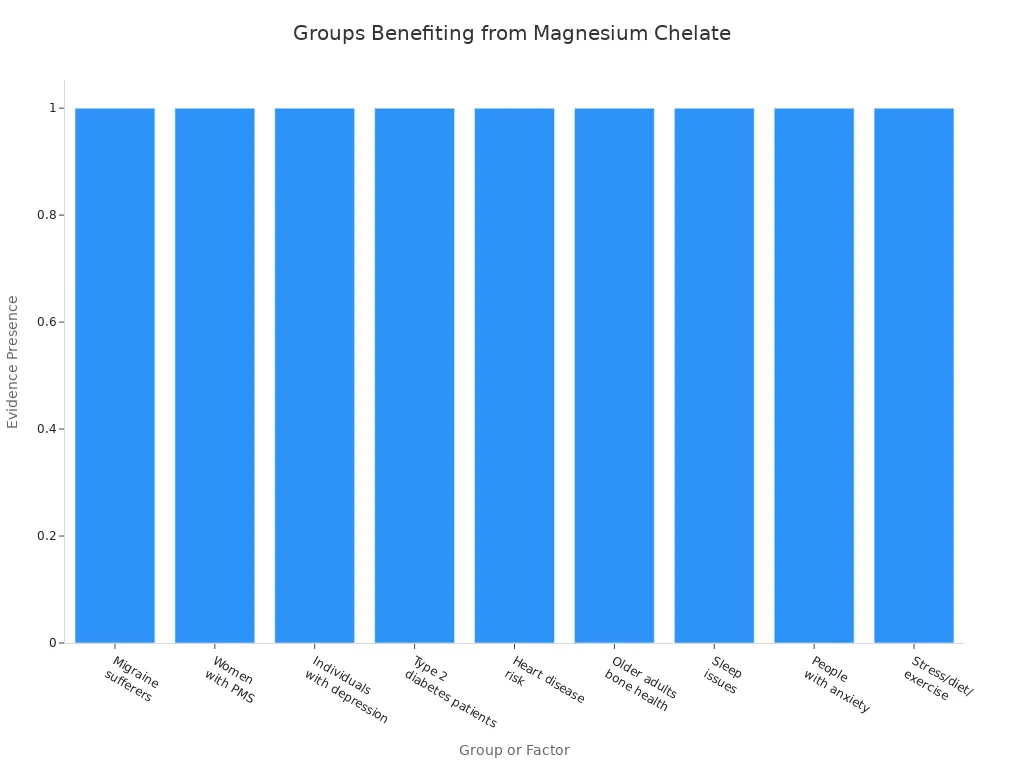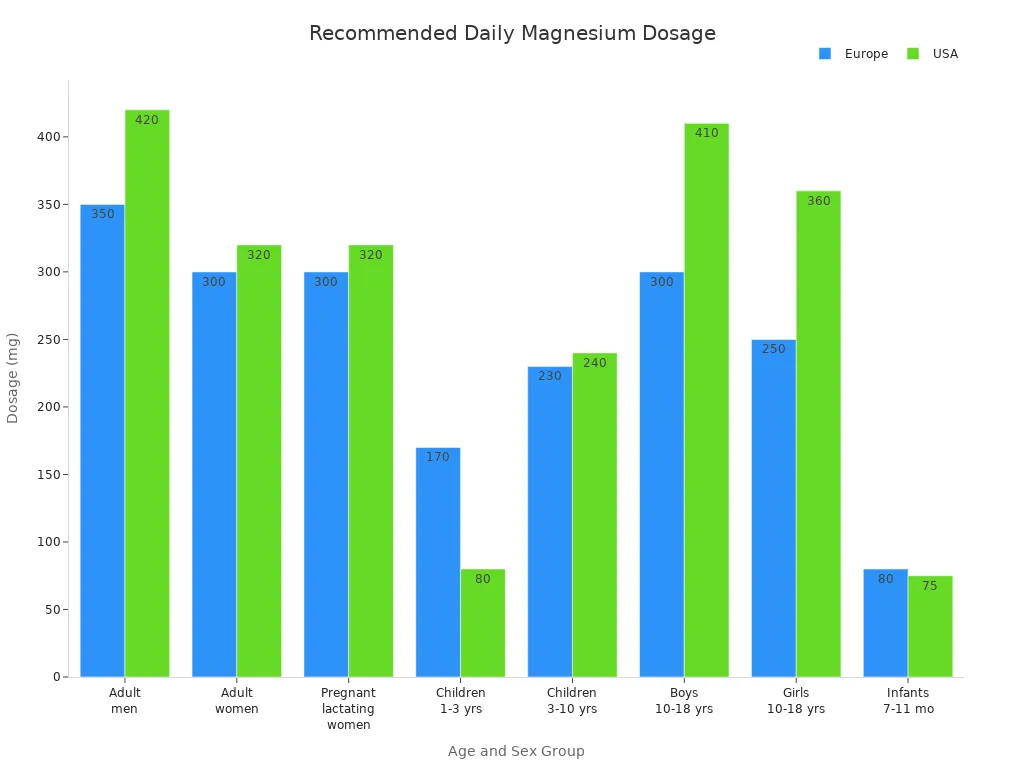Unlocking the Health Benefits of Magnesium Chelate Today
Table of Contents

Magnesium stands out as an essential mineral your body needs for strong muscles, steady nerves, and overall health. Yet, many people fall short on daily magnesium.
| Demographic Group | % Estimated to Have Inadequate Intake |
|---|---|
| Males (≥19 years) | ~48% to 58% |
| Females (≥19 years) | ~42% to 52% |
Magnesium chelate offers a solution. This chelated form absorbs much better than traditional magnesium supplements and feels gentler on your stomach. Unlike other types, chelated magnesium does not cause digestive upset. Nutrition experts recommend you choose magnesium chelate for better absorption and fewer side effects.
What Is Magnesium Chelate?
Magnesium chelate is a special type of magnesium supplement. In this form, magnesium binds to organic molecules like amino acids or small peptides. This binding creates a stable ring structure, which scientists call “chelation.” The chelated structure protects magnesium as it moves through your digestive system. You get better magnesium absorption and fewer stomach problems compared to other forms of magnesium.
How Magnesium Chelate Works
When you take chelated magnesium, the magnesium ions attach to amino acids at several points. This creates strong coordinate covalent bonds. These bonds are much stronger than the ionic bonds found in regular magnesium salts. The chelated shell shields magnesium from harsh stomach acids and other foods that might block its absorption.
Your body absorbs chelated magnesium in the small intestine. It uses special pathways, such as the dipeptide transporter, to move the chelated mineral into your bloodstream. This means you get more magnesium where your body needs it. Studies show that chelated magnesium stays stable and soluble in your gut, so your body can use it better. You also avoid the digestive side effects that sometimes come with other forms of magnesium.
Tip: Chelated magnesium is gentle on your stomach. You can take it daily without worrying about diarrhea or cramps.
Magnesium Chelate vs. Other Forms
You can find many forms of magnesium supplements. Each one has different absorption rates and effects on your body. Here is a quick comparison:
| Magnesium Supplement Form | Description | Absorption/Bioavailability | Digestive Effects |
|---|---|---|---|
| Magnesium Oxide | Inexpensive, inorganic salt | Low; poorly absorbed | May cause diarrhea, GI discomfort |
| Magnesium Citrate | Organic salt, common choice | Moderate to high; better than oxide | Mild laxative effect |
| Magnesium Bisglycinate (Chelated) | Chelated to two glycine molecules | High; superior to non-chelated | Gentle, well-tolerated |
| Magnesium Chloride | Available in tablets, oils, lotions | Fair; less than chelated forms | May cause digestive issues |
| Magnesium L-threonate | Newer, crosses blood-brain barrier | High; comparable to chelated forms | Well-tolerated |
Clinical studies show that chelated magnesium, such as magnesium bisglycinate, has the highest bioavailability. Your body absorbs it better than magnesium oxide or citrate. Magnesium oxide, while cheap, often passes through your system without being absorbed. It can also cause diarrhea, which is why some people use it as a laxative. Magnesium citrate absorbs better than oxide but still does not match the absorption of chelated magnesium.

Magnesium absorption depends on the form you choose. Chelated magnesium uses extra absorption pathways, so your body can take in more of the mineral. This means you get more benefits from each dose. You also avoid the stomach upset that comes with some other forms of magnesium.
Note: If you have a sensitive stomach or want the best absorption, chelated magnesium is often the top choice.
Chelated Magnesium Benefits

Magnesium plays a vital role in your body. You need it for over 300 enzymatic reactions that keep you healthy every day. When you choose chelated magnesium, you help your body absorb this mineral more efficiently. This means you get more of the health benefits with fewer digestive problems.
Some of the most important functions of magnesium include:
- Supporting energy production by helping convert food into ATP, your cell’s main energy source.
- Assisting in protein synthesis, DNA and RNA creation, and phosphorylation.
- Regulating nerve signals and muscle contractions by controlling calcium channels.
- Maintaining healthy blood sugar regulation and supporting bone health.
- Helping your body repair and grow by supporting enzyme-substrate interactions.
Muscle and Nerve Health
Your muscles and nerves rely on magnesium to work properly. Chelated magnesium helps your body absorb more of this mineral, which supports muscle strength, flexibility, and nerve signaling. Clinical studies show that magnesium chelate, especially magnesium creatine chelate, can improve muscle power, hydration, and recovery. For example, one study found that young adults who took magnesium chelate with creatine for two weeks gained more muscle strength and had better cellular hydration.
| Study (Author/Year) | Subjects (Age) | Magnesium Form | Main Findings |
|---|---|---|---|
| Brilla et al., 2003 | 35 active (19–24 y) | Mg creatine chelate | Increased muscle power, better hydration, and higher protein synthesis |
| Brilla and Haley, 1992 | 26 untrained (18–30 y) | Mg oxide | Improved muscle strength (quadriceps torque) |
| Golf et al., 1998 | 23 triathletes | Mg orotate | Better performance, less stress, improved recovery after exercise |
| Kass and Poeira, 2015 | 13 adults (38.5 y) | Mg citrate | Higher bench press performance, lower blood pressure after exercise |
Magnesium also protects your nerves. It blocks harmful calcium from entering nerve cells, which helps prevent nerve damage and supports nerve regeneration. This means chelated magnesium may help you recover from injuries and keep your nervous system healthy.
| Benefit Category | Description | Mechanism / Details |
|---|---|---|
| Neuroprotection | Protects nerve cells, improves outcomes in brain injuries | Blocks NMDA receptors, reduces cell death |
| Anti-inflammatory Effects | Lowers inflammation that can damage nerves | Reduces cytokines and harmful immune responses |
| Nerve Regeneration Support | Helps nerves regrow and recover | Supports axon growth, myelin formation, and neurotransmitter release |
| Clinical Correlations | Low magnesium linked to nerve diseases like neuropathy and Parkinson’s | Shows the importance of magnesium for nerve health |
Heart and Blood Pressure Support
Your heart and blood vessels need magnesium to function well. Chelated magnesium helps relax blood vessels, supports healthy blood pressure, and keeps your heart rhythm steady. Several clinical trials show that magnesium chelate can lower both systolic and diastolic blood pressure in people with hypertension. For example, one study gave patients 600 mg of magnesium pidolate daily for 12 weeks and saw a significant drop in blood pressure.
| Study Population | Magnesium Chelate Form and Dose | Comparator | Duration | Clinical Outcome |
|---|---|---|---|---|
| 24 patients with hypertension | 600 mg magnesium pidolate | 24 matched controls | 12 weeks | Lowered 24-hour systolic and diastolic BP |
| 35 patients with essential hypertension | 70.8 mg/d magnesium + potassium | 32 on lacidipine | 4 weeks | Lowered BP, improved arterial compliance |
| 60 hypertensive patients | 20 mmol/d magnesium oxide | Same patients (crossover) | 8 weeks | Lowered office, home, and 24-hour BP |
| 15 patients with mild hypertension | 600 mg/day magnesium oxide | Placebo | 6 weeks | Lowered systolic, diastolic, and mean BP |
| 698 adults with high-normal BP | 360 mg magnesium diglycine | 1 g calcium carbonate | 6 months | No significant BP changes |

Magnesium acts as a natural calcium channel blocker. It helps your blood vessels relax and improves blood flow. Some studies show that magnesium supplementation can lower blood pressure by about 2 mm Hg for systolic and 1.8 mm Hg for diastolic readings. These changes may seem small, but they can make a big difference for your heart health over time. However, not all studies agree, so more research is needed to confirm these effects in everyone.
Sleep, Mood, and Immunity
You need good sleep and a balanced mood for overall health. Chelated magnesium, such as magnesium glycinate, supports both. It helps your brain produce calming neurotransmitters and regulates the stress hormone cortisol. In a clinical trial, elderly adults who took 500 mg of magnesium daily slept longer, fell asleep faster, and had higher melatonin levels. They also felt less anxious and had fewer insomnia symptoms.
Magnesium chelate helps stabilize your mood by reducing anxiety and depression symptoms. It does this by supporting the GABA system in your brain, which calms nerve activity. While direct evidence for immune support is limited, magnesium’s role in reducing stress and balancing hormones may help your immune system recover overnight.
Tip: Chelated magnesium is gentle on your stomach. You can take it every day without worrying about diarrhea or cramps. Registered dietitians recommend magnesium glycinate for daily use because it is easy to tolerate and supports stress relief, sleep, and muscle relaxation.
Magnesium chelate stands out for its high bioavailability and gentle effect on digestion. Unlike other forms, such as magnesium citrate, it does not cause digestive upset even at higher doses. This makes it a smart choice for daily supplementation.
When you choose chelated magnesium, you support your muscles, nerves, heart, sleep, mood, and immune system. You also help your body with blood sugar regulation and bone health. This makes chelated magnesium a powerful tool for your overall health.
Magnesium Deficiency and Risk Groups

Signs of Low Magnesium
You might not notice magnesium deficiency right away. Early signs can be mild, but they often get worse if you do not address them. Watch for these common symptoms:
- Muscle cramps, twitches, or tremors, especially in your legs, feet, or hands
- Fatigue and muscle weakness
- Loss of appetite, nausea, or vomiting
- Tingling or numbness in your limbs
- Mood changes like apathy, anxiety, depression, or insomnia
If magnesium deficiency becomes severe, you may experience seizures, abnormal heart rhythms, or even coronary spasms. Some people develop low calcium or potassium levels, which can cause more muscle cramps, weakness, and heart problems. Magnesium is essential for your muscles, nerves, and heart. Without enough, your body cannot work as it should.
If you notice frequent muscle cramps or feel tired all the time, you might want to check your magnesium levels.
Who Needs Magnesium Chelate
Some groups have a higher risk of magnesium deficiency. You may need extra magnesium if you belong to one of these groups:
| Population Group | Prevalence of Magnesium Deficiency (%) | Key Risk Factors and Notes |
|---|---|---|
| Pregnant Women | Up to 78.9% | High risk due to pregnancy demands, blood pressure, and previous complications |
| Women with Hormone-Related Conditions | Up to 54.8% | Includes osteoporosis, menopause, oral contraceptive use |
| General Adult Women | 21.0–40.0% | Higher risk than men, especially with age or certain health conditions |
People with poorly controlled diabetes, digestive disorders like Crohn’s disease or celiac disease, and those who use certain medications (such as diuretics or antibiotics) often lose more magnesium. Alcohol use can also lower your magnesium levels. Older adults may not absorb magnesium as well, and they often need more to support sleep and muscle function.
You may benefit from magnesium chelate if you:
- Have type 2 diabetes or insulin resistance
- Suffer from migraines or frequent headaches
- Experience anxiety, depression, or trouble sleeping
- Deal with PMS or hormone changes
- Face high stress, poor diet, or intense exercise routines

Magnesium chelate absorbs better than other forms, so it helps you restore healthy levels faster. If you belong to a risk group or notice symptoms, talk to your doctor about magnesium chelate. This can help you protect your health and prevent the effects of magnesium deficiency.
Using Magnesium Chelate Safely
Choosing the Right Supplement
You want the best results from magnesium supplements. Start by checking the type of magnesium in the product. Magnesium glycinate, taurate, and threonate offer high absorption and gentle effects on your stomach. These forms support sleep, mental health, and heart health. Magnesium oxide and citrate work better for constipation but may cause digestive side effects.
Look for magnesium products from trusted brands. Choose supplements with third-party testing or the USP Verified Mark. This mark means the product meets strict standards for quality, purity, and potency. Regulatory agencies and consumer programs use these steps to check magnesium supplement quality:
- Auditing the manufacturing facility for compliance with safety rules.
- Reviewing product documentation for quality control.
- Testing samples in a lab to confirm standards.
- Performing off-the-shelf checks to ensure ongoing quality.
You should also consider your health goals. If you want better sleep, magnesium glycinate is a good choice. For mental focus, magnesium threonate may help. Check for extra ingredients like melatonin or GABA if you need support for sleep. Capsules, powders, and sprays all work, so pick what fits your routine.
Tip: Always read the label and check the amount of elemental magnesium in each serving.
Dosage and Safety Tips
You need the right dose for safety and effectiveness. Health authorities recommend these daily amounts of elemental magnesium:
| Group | Recommended Daily Dosage of Elemental Magnesium (mg) | Source |
|---|---|---|
| Adult men (USA) | 350-420 | NIH |
| Adult women (USA) | 300-320 | NIH |
| Pregnant/lactating women (USA) | 300-320 | NIH |
| Children 1-3 years | 80 | NIH |
| Children 4-8 years | 130 | NIH |
| Boys 9-13 years | 240 | NIH |
| Girls 9-13 years | 240 | NIH |

Do not exceed 350 mg of supplemental magnesium per day unless your doctor tells you to. Taking too much can cause diarrhea, nausea, and stomach cramps. Rarely, high doses lead to serious problems like irregular heartbeat or muscle weakness. People with kidney disease, diabetes, or digestive disorders need extra caution. Magnesium supplements may interact with medicines such as antibiotics or bisphosphonates.
Common side effects include:
- Diarrhea
- Nausea
- Stomach pain
Serious reactions are rare but need medical help:
- Severe diarrhea or cramps
- Allergic reactions (hives, swelling, trouble breathing)
- Irregular heartbeat or fainting
Note: Always talk to your healthcare provider before starting magnesium supplements, especially if you have health conditions or take other medications.
You should measure liquid magnesium products carefully. Do not chew or crush tablets unless the label says it is safe. Regular blood tests may help monitor magnesium levels if you use supplements long-term.
Magnesium chelate stands out for better absorption, gentle digestion, and strong support for your heart, nerves, and bones. You get calming effects and fewer side effects compared to other forms.
You should check your magnesium needs and talk with a healthcare provider if you notice muscle cramps or fatigue.
Here are key reasons to choose chelated magnesium:
- Higher bioavailability and stability
- Less risk of stomach upset
- Supports sleep, heart health, and blood sugar control
| Benefit | Explanation |
|---|---|
| Better absorption | Chelated magnesium is absorbed more efficiently, leading to greater effectiveness. |
| Gentler on digestion | Less likely to cause gastrointestinal side effects such as diarrhea or nausea. |
| Enhanced heart health | Supports regulation of heart rhythm and blood pressure, reducing cardiovascular risk. |
You can make smart choices by learning about supplement types, watching for deficiency signs, and combining magnesium with a balanced diet for overall wellness.
FAQ
What is the best time to take magnesium chelate?
You can take magnesium chelate with or without food. Many people prefer taking it in the evening. This may help you relax and sleep better. Always follow the instructions on your supplement label.
Can you take magnesium chelate every day?
Yes, you can take magnesium chelate daily. It is gentle on your stomach and safe for most people. Do not exceed the recommended dose unless your doctor tells you to.
Does magnesium chelate interact with other medications?
Magnesium chelate may affect how your body absorbs some medicines, such as antibiotics or osteoporosis drugs. You should take these medicines at least two hours apart. Always ask your doctor or pharmacist before starting a new supplement.
How do you know if you need magnesium chelate?
You may need magnesium chelate if you have muscle cramps, trouble sleeping, or feel tired often. People with certain health conditions or diets may need extra magnesium. A doctor can check your levels with a blood test.
Are there any side effects from magnesium chelate?
Most people tolerate magnesium chelate well. Some may notice mild stomach upset or diarrhea if they take too much. If you have kidney problems, talk to your doctor before using magnesium supplements.

Poseidon
Master of Nutritional Epidemiology, University of Copenhagen, Herbal Functional Nutrition Researcher
Focus: The scientific application of natural active ingredients such as Tongo Ali, Horny Goat Weed, and Maca to sexual health and metabolic regulation.
Core Focus:
Men: Use a combination of Tongo Ali (an energizing factor) + Maca (an energy reserve) to improve low energy and fluctuating libido.
Women: Use a combination of Horny Goat Weed (a gentle regulator) + Maca (a nutritional synergist) to alleviate low libido and hormonal imbalances.
Stressed/Middle-Aged Adults: This triple-ingredient synergy supports metabolism, physical strength, and intimacy.
Product Concept:
Based on traditional applications and modern research (e.g., Tongo Ali promotes testosterone-enhancing enzyme activity, and icariin provides gentle regulation), we preserve core active ingredients and eschew conceptual packaging—using natural ingredients to address specific needs.
Simply put: I'm a nutritionist who understands "herbal actives." I use scientifically proven ingredients like Tongo Ali, Epimedium, and Maca to help you make "sexual health" and "nutritional support" a daily routine.
